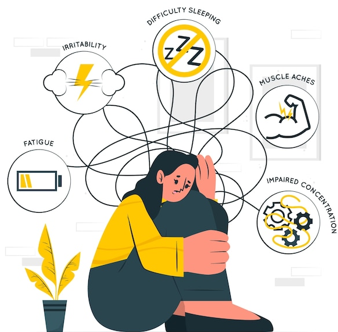Understanding Your Anxiety - It is Possible!
Anxiety has become more common in recent years, and it does not discriminate between age, gender, education or socio-economic status. Regardless of our success, maturity or intellect, anxiety can have us buckling at our knees and feeling hopelessly overwhelmed.
Impact on physical and mental health
Anxiety affects our lives in countless ways. It has direct, measurable impacts on us physiologically, mentally, emotionally and socially.
1. Physiological impacts - anxiety and the Adrenal Glands
When we are stressed and anxious, the adrenal glands produce hormones that support the balance of many body functions. These glands are extremely important in the production and function of hormones in all of us – men, women, and children. If the adrenal glands are not functioning properly, we will experience imbalances in our hormonal system in many ways.
When we experience anxiety, the brain sends signals to our endocrine system to release hormones, including cortisol, to prepare us to cope with the source of the distress. This is designed to be a short-term measure to help us move through the “danger” and back into safety. However, when we experience long term or chronic anxiety, the adrenal glands can produce too much cortisol, and over time the adrenal glands can become exhausted and will no longer be able to produce adequate cortisol.
This is when we begin to experience physical symptoms such as exhaustion, changes in weight, changes in appetite, sleep disturbances, muscle aches and pains, digestive issues and susceptibility to other illnesses.
2. Mental impacts - anxiety and the brain
Anxiety affects working memory – this is our ability to hold information in our minds for short periods of time to be able to do something with it.
Anxiety distracts our attention – this shows up as an inability to focus on what is important for us and we struggle to concentrate.
Anxiety can lead to avoidance – when anxiety shows up, it is extremely uncomfortable, and we natural want to avoid anything that will make it worse.
Thought processing and decision making – when anxiety is present, it is very difficult to make sense of our thoughts or make rational decisions that are in line with what we want.
3. Emotional impacts - anxiety and our emotions
Anxiety creates fear – having a sense of dread and worrying that bad things will happen if you stop worrying.
Anxiety can cause embarrassment – feeling like everyone can see that you are anxious and that there is something wrong with you.
Anxiety creates heightened emotions – feeling everything more intensely is common with anxiety because it is so difficult to regulate our emotions when we are highly anxious.
4. Social impacts - anxiety and our ability to connect with others
Feeling Isolated – feeling like we are different to everyone else and that we are unlovable.
Loneliness – feeling so different that we are convinced we will be rejected if anyone were to find out.
Self-criticism – harshly judging everything we do and say in social situations, making us feel even less able to relax.
Avoiding social new opportunities – worrying that we will not be able to cope in social settings.
Inauthenticity – putting on a “brave face” and pretending to be ok when we really aren’t.
But there is good news – anxiety doesn’t have to dictate your life!
Anxiety is a natural physiological response genetically inherited from our pre-historic ancestors, specifically designed to keep us safe.
Neuroscience has helped us to understand a great deal about how our autonomic nervous system works in relation to anxiety.
Our nervous system holds the key to calming our anxiety responses and this information can be life changing.
We can learn how to support our bodies through anxiety and into a calmer, more regulated space.
These approaches and interventions can be learned by anyone, regardless of age or education.
We can learn to trust our bodies rather than fear them.
If you are keen to understand your anxiety, to discover your nervous system’s unique signals to you and what it might need to support you back to a sense of possibility, please reach out to me at Healing Insights Counselling.
I look forward to connecting with you in a conveniently located in a relaxed, non-clinical space in Carina, close to public transport, and easy parking.





